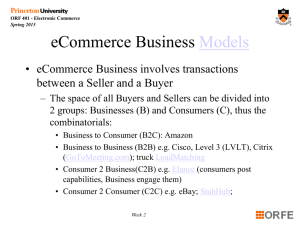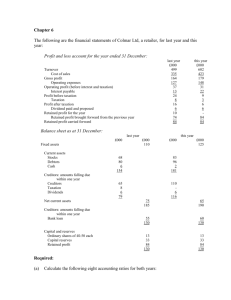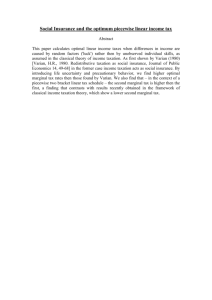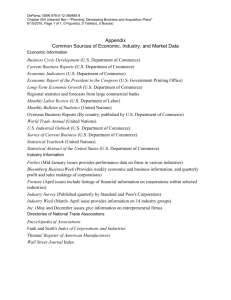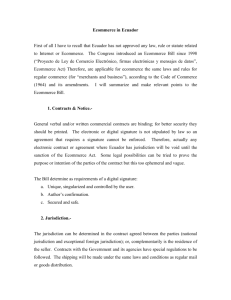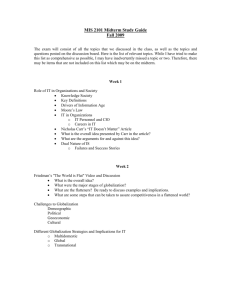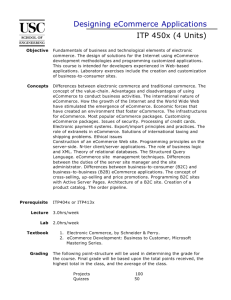Guest Lecture 2: 90-742 Ecommerce April 10, 2001
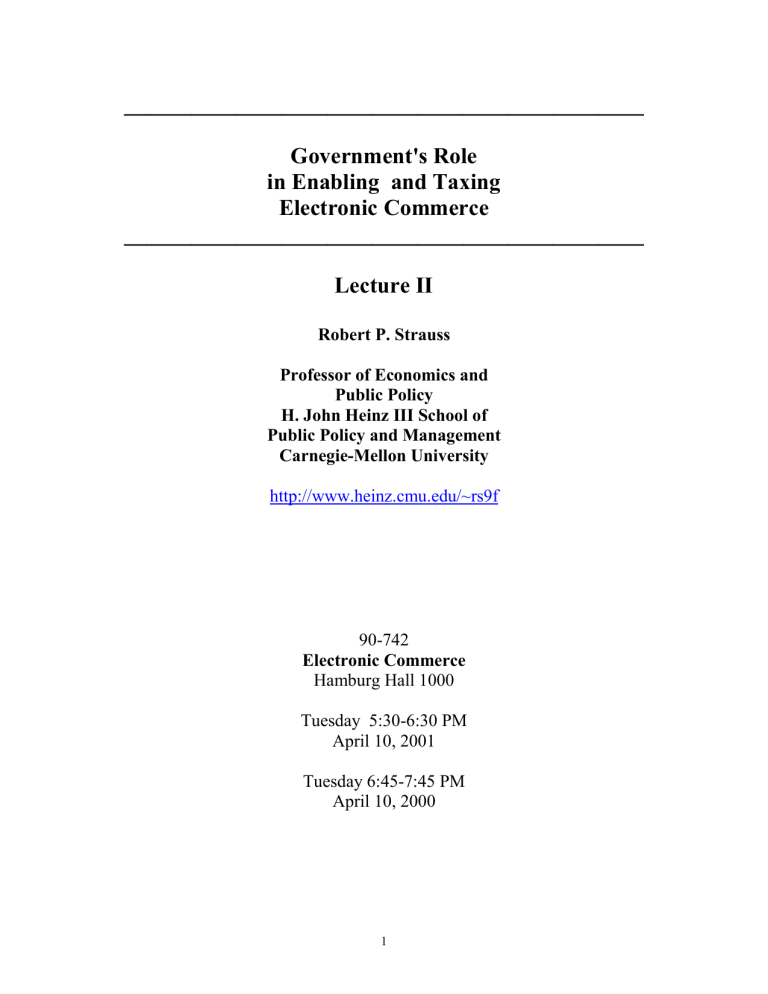
______________________________________________
Government's Role in Enabling and Taxing
Electronic Commerce
______________________________________________
Lecture II
Robert P. Strauss
Professor of Economics and
Public Policy
H. John Heinz III School of
Public Policy and Management
Carnegie-Mellon University http://www.heinz.cmu.edu/~rs9f
90-742
Electronic Commerce
Hamburg Hall 1000
Tuesday 5:30-6:30 PM
April 10, 2001
Tuesday 6:45-7:45 PM
April 10, 2000
1
1.
Possible Exam Question to Class:
Why are most of the retail Web commerce problems discussed not present in B2B transactions?
What if B2B transactions are executed via the Web or via EDI lines?
2
Lecture # 2: Taxation of Activities on the Net
How Government can/should(?) tax Ecommerce
What are the learning objectives in this lecture?
Provide several kinds of context so you can understand the debate, policy issues, tradeoffs being discussed
1.
Explain the rudiments of tax policy design
2.
Explain the constitutional context which is peculiar to
US as it affects taxation;
3.
Explain the particular problems which arise from ecommerce which makes taxation hard;
4.
Explain the policy debate(s) at state and national levels
5.
Explain solutions to the problem which appears to meet all the constraints
3
1. Rudiments of Tax Policy Design: Basics
1.A. Why have taxes at all?
---To finance public services like education, health, income maintenance, national defense.
1.B. Why kind of taxes might one use?
---taxes on holding of wealth (moment in time measurement)
---taxes on income or consumption of people and businesses over time (accounting period)
1.C. Geography and taxes: what principles?
---taxation should rest where public budget provides services, e.g. destination.
Income taxes on residence basis
Consumption/transactions taxes on destination basis
---boundary problems of sales across states or sales across international boundaries
4
STATE A__ STATE B__________
Customer Seller/Manufacturer
Destination of Sale: State A
Origin of Sale: State B
5
1.D
.
Rudiments of Tax Policy Design: Federalism Issues
Who collects taxes in the US, what kinds of governments are there?
---national government, state governments, counties, cities, school districts, special districts (80,000!)
What kinds of taxes are allowable?
---fiscal concurrency in US constitution
---state and local governments local government is entirely under control of
“state parent” state sovereignty and fiscal competition
State and Local consumption taxes are on the order of 1/3 of state revenue.
National government has no consumption taxes to speak of
What are state prerogatives in sales and use tax areas?
What are the major features of any state sales and use tax?
The rate of tax at the state level (4-7%)
6
Definition of taxable goods and services (what is taxable, what is exempt?)
Mechanisms to avoid double/triple taxation: exemption of items purchased to be used in manufacturing
Payment mechanisms; record keeping requirements; audit mechanisms
Result?
Diversity….especially with local sales and use taxes. (Philadephia and Allegheny County examples).
7
2. Are there US constitutional restrictions on state action commerce clause equal protection clause due process clause
2.A How are disputes over what is allowable resolved?
US Constitution stipulates that US Supreme Court is final decision maker
US Supreme Court decides whether or not commerce clause is violated, and proclaims what the states and localities can, and can not do.
2.B What is the current legal situation with regard to remote sales?
Each state with a sales tax obligates its residents to pay a use tax on the importation of taxable goods and services into the state of residence. 45 states.
The Supreme Court long ago decided that the rate of use tax can not be higher (but can be lower) than the tax on intra-state sales of the same item.
In National Bella Hess and then Quill the Court decided that remote sellers do not have the obligation to collect and remit on behalf of the buyer if the seller does not have a physical presence in the buyer’s state.
8
Long ago the Court decided that if a remote seller ships by a common carrier (UPS, FedEx) into the buyer’s state, the seller does not have a physical presence. The general solicitation by anonymous mailings of catalogues does not constitute having a physical presence.
Result?
QVC, LLBean, Lands End. Foregone revenues to state and local governments.
The Basic Economics of Ecommerce
Two Constraints: bandwidth and trust
Two Benefits: Price and Convenience
Fiscal implications are obvious too.
9
3. Tax Problems for States Caused by Ecommerce
Aggressive tax planning opportunities caused by:
Saks Fifth Avenue case
Borders.com
4 Basic Questions of Taxation and Ecommerce
Issues
1. Who,
2. What,
3. When,
4. Where?
Virtual books and virtual fraud…Bartering
10
4. The Ecommerce Tax Policy Forums and Fights
4.A. Broad Contour of Issues
Just as New Economy wants state by state protection for regulating commerce, it also wants to be excluded from collecting and remitting use taxes. Why?
(i) State sales and use taxes are resented by business because:
Double taxation of business inputs (about 45% is cascaded)
Vague statutes and predatory audit behavior of states during times of fiscal duress
(ii) Local sales and use taxes are a nightmare to administer by companies.
(iii) Bricks and mortar retailers face competitive inequities from remote sellers not currently subject to use taxation.
(iv)States believe their sales and use tax bases are being eroded by Quill and Bella Hess. Ecommerce will accelerate this.
11
4.B. The Idea of The Great Political Trade
Business will agree to an expanded duty to collect and remit use taxes
In return for:
One rate per state and simplification and standardization of sales and use tax administration
4.C. Forums where details of agreement were to be worked out:
Telecommunications and Electronic Commerce
(September 7, 1999 Final Report on Web) 1997-99.
1. National Tax Association Project on Taxation of
2. National Advisory Commission on Electronic
Commerce which could not agree on anything by supermajority, no budget, can receive ‘gifts.’ 1998-2000.
4.D. Current Public Policy Approaches
(i) State Cooperative agreements: NCSL and
National Governor’s Association Idea of Trusted Third
Party and Private Tax Collection Agency
12
or
(ii) federal legislation?
What kind of federal legislation?
1998 Moratorium was first federal act.
Polar Forms of Federal Policy:
(1.) National consumption tax, IRS collects and shares $ back to states
States lose control of consumption tax base.
Governors riot.
What about local governments?
(2) Federal legislation obligates remote sellers to collect and remit, but it’s up to states to police
Fiscal hunting in the dark? What kind of compliance is likely?
(3)Federal legislation obligates remote seller
Into state with “qualified” sales and use
Tax to remit, or imposition of federal penalty excise of 15%.
13
(4) Federal information reporting like Jenkins
Act for Tobacco products. Note Iowa method of using state consumer law and commercial law to reach remote vendors
4.E. Federalism (federal vs. states) Issues:
Standards for purely electronic record keeping
(financial accounting and tax for income tax purposes)
Certification and supervision of digital signatures, digital documents
Federal trusted third parties to maintain records(IRS, Federal Reserve System, Postal System?)
14
5.0 Political Forecasts this Year:
Predictions:
No Deal Until Revenues Are Really Impacted and/or
Main Street and Old Economy + Government
Gang Up on New Economy and Threaten Congress
No New Moratorium, Slowly growing chaos and
Pressure on tech industry.
15



